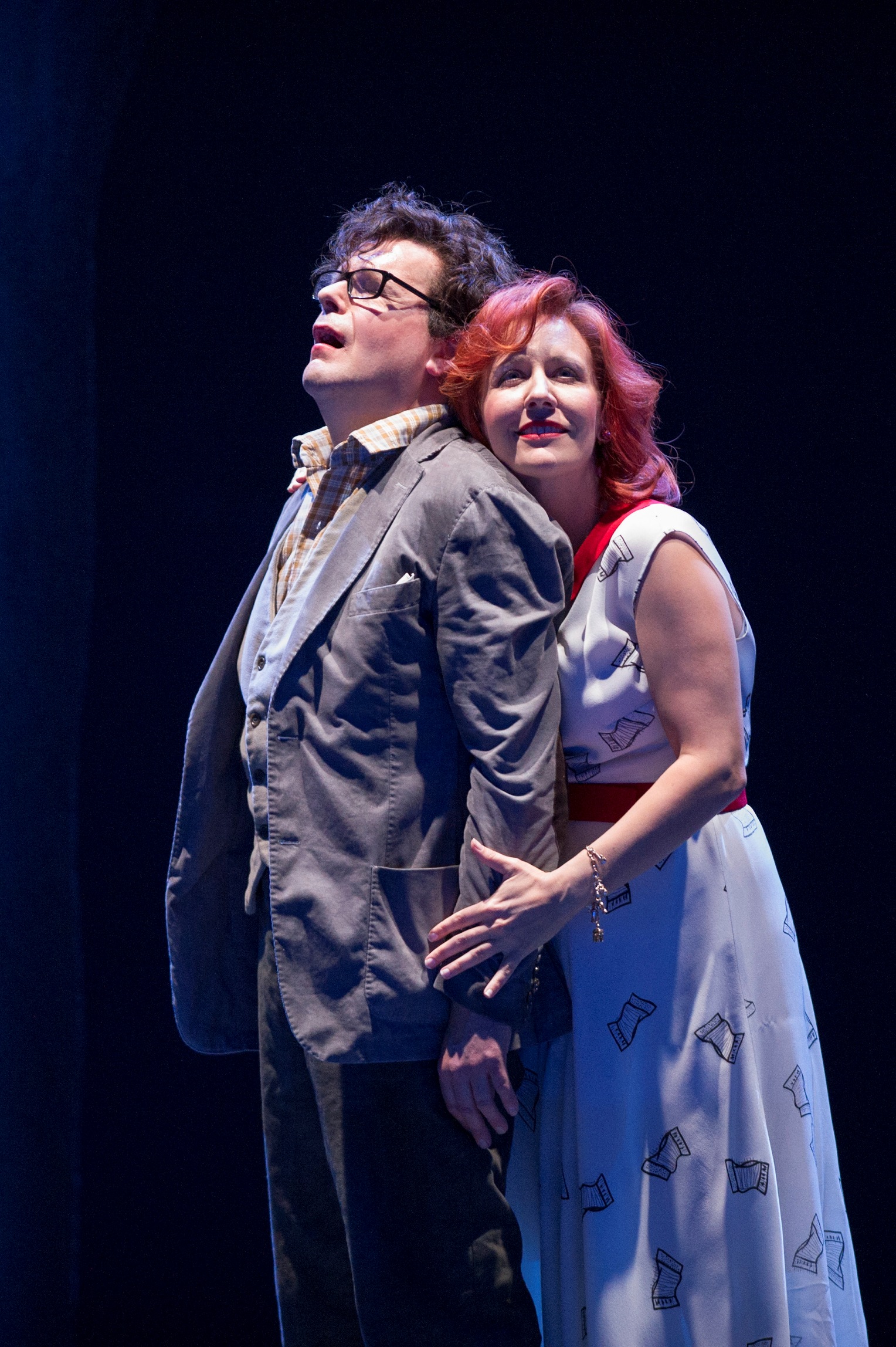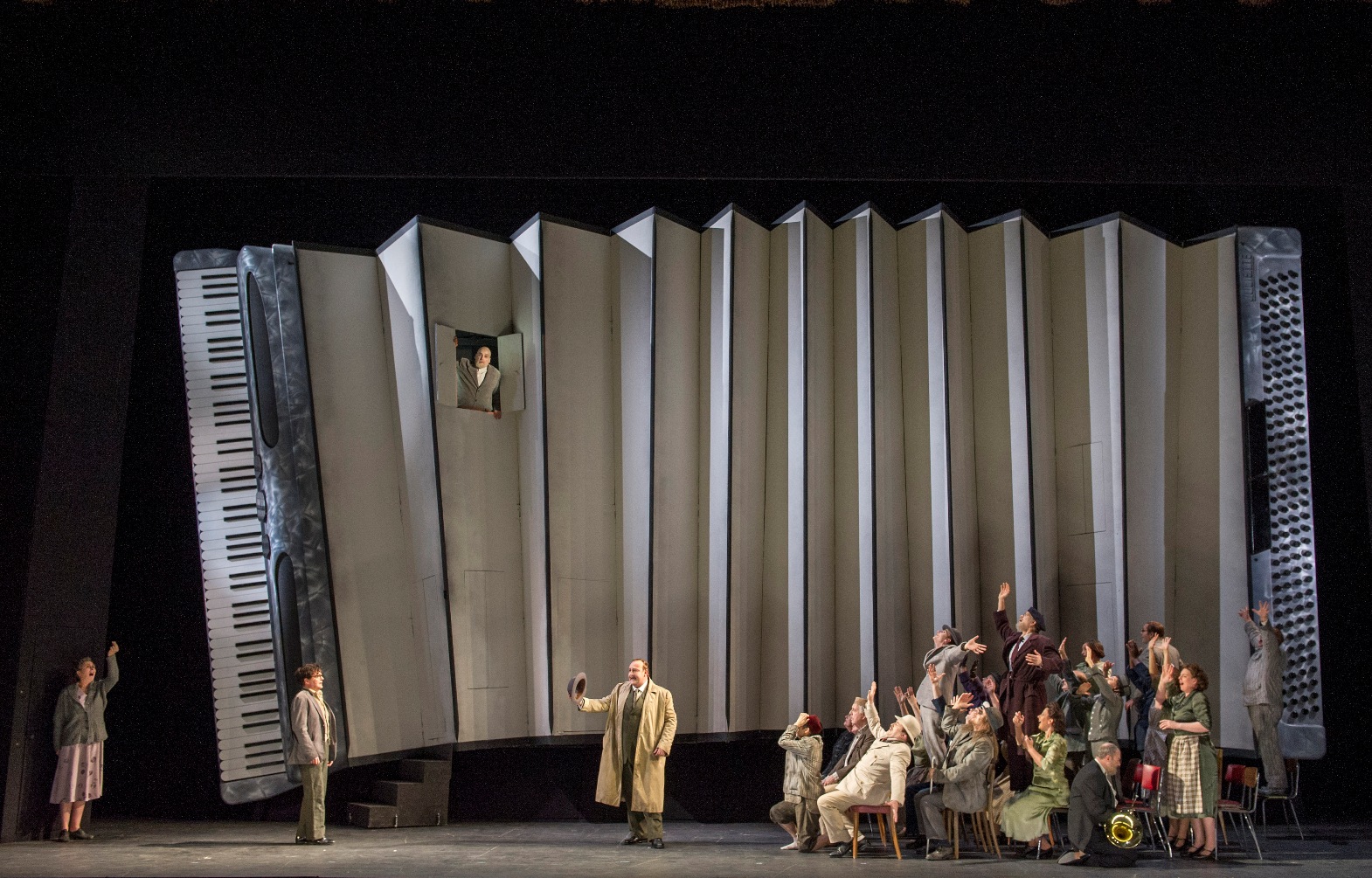Julietta, English National Opera | reviews, news & interviews
Julietta, English National Opera
Julietta, English National Opera
Martinů's dream opera comes across with stunning clarity in a production that delivers on all fronts

Pick the right dream, and you just might retrieve a precious memory, even in nightmarish terrain where everyone else has lost theirs. That message seems to have been uncannily prophetic for Bohuslav Martinů, who began work on Julietta in 1936, soon to face the terrifying clean slate of a longer exile from his beloved Czechoslovakia with the onset of the Second World War.
A giant piano accordion dominates the stage in Antony McDonald's stunningly simple designs, differently (de)constructed for the three acts' respective town, forest and Office of Dreams. It's an apt metaphor, for the accordion tune heard minutes into the opera is a partial aide-memoire for the inhabitants of the dreamville into which Michel, Sartre-alike bookseller from Paris, has sleepwalked. Warm, nostalgic music, which in Martinů's alchemical hands has more than a hint of his native land, provides partial relief for a collective amnesia which our age recognises with some anxiety as collective Alzheimer's.
 In a queasy little vignette, two old people visit a bar to be comforted by a wine waiter with an imaginary past they can't remember; a lushly-scored vision of a romantic Spanish holiday that never happened takes the fancy of the chimerical Julietta and gets Michel out of a sticky situation. The flyaway absurdity of Michel's encounters is anchored only by the incandescent moment he recalls of hearing a girl's voice at a piano through an open window: the purpose of his dream-visit, crucially remembered in each act. The most chilling, stilling moment in Jones's production is when Michel's own memory begins to fail after a crisis in which he may, or may not, have shot his beloved Julietta.
In a queasy little vignette, two old people visit a bar to be comforted by a wine waiter with an imaginary past they can't remember; a lushly-scored vision of a romantic Spanish holiday that never happened takes the fancy of the chimerical Julietta and gets Michel out of a sticky situation. The flyaway absurdity of Michel's encounters is anchored only by the incandescent moment he recalls of hearing a girl's voice at a piano through an open window: the purpose of his dream-visit, crucially remembered in each act. The most chilling, stilling moment in Jones's production is when Michel's own memory begins to fail after a crisis in which he may, or may not, have shot his beloved Julietta.
The role calls for the most accomplished of singing actors, and tenor Peter Hoare, following his triumph as the man-beast Sharikov in ENO's equally disconcerting production of A Dog's Heart, follows in Philip Langridge's footsteps by matching a naturalism that makes Michel's dream horribly real with singing of infallible brilliance, subtle when need be, the text perfectly enunciated.
Verbal clarity throughout matches the off-kilter simplicity of Jones's concept, and with the aid of movement director Philippe Giraudeau, this most musically fine-tuned of directors makes sure that stylised steps constantly breaking into odd little dances inform the hard-working performances of the entire cast. A trio of mini-me Michels (Emilie Renard, Clare Presland and Samantha Price) spookily stalk the chief dreamer, at one point balletically transformed into the crocodile image Julietta has conjured to mock her idealistic suitor as the orchestra goes berserk. Julietta herself, lustrously sung by the generous Julia Sporsén (pictured with Hoare above right), is no pale idol but a slightly scary tease flipping between jerky and fluid gestures.
Crystal-clear vignettes in multiple roles come from other fine music-theatre performers, including Andrew Shore, who gets to camp it up à l'Espagnol as the seller of photographic memories, Jeffrey Lloyd-Roberts as several faces of officialdom and Susan Bickley as an hysterical fortune teller who, you've guessed it, reads the past and not the future.

Above all, though, it is the orchestra which carries Martinů's unnerving fluctuation between brittle absurdity and burgeoning sincerity. Gardner keeps a tight, Stravinsky-style rein on the pastiches of the funny little quacking-duck number in Act One and the more acidulous moments of the second act's quick-changing forest kaleidoscope, a sequence whose end is impossible to predict as a number of high-point resolutions come and go. In a deliberate disjunction with the mechanics of Jones's stage action, Gardner conducts the love-music with opulent abandon and creates magic in the first two curtains, even as the lights go up to wake the audience, and by implication Michel too, from the dream (only a few were inclined to fidget).
Finally, he strikes the depths as the music underlines the last act's sinister message: those who want to live forever in their dreams are lost to life. The drop-curtain of a sleeping Michel in various positions spelling out "Julietta" returns him to sleep; he prefers to re-enact his visit to dreamland. The repeated images from Act One and the failure of the now-expected lights-up on the auditorium freeze the blood, but the orchestra simultaneously thaws it with a final benediction over a love that may be regained, if only in another world. The fusion of sound and vision is masterly, disconcerting to the last. There have been quite a few special pleadings for Julietta in recent years, not least David Pountney's cluttered but ultimately moving production for Opera North; this is the one which ought to restore the opera to its rightful place at the centre of the 20th century operatic repertoire.
Explore topics
Share this article
Add comment
The future of Arts Journalism
You can stop theartsdesk.com closing!
We urgently need financing to survive. Our fundraising drive has thus far raised £33,000 but we need to reach £100,000 or we will be forced to close. Please contribute here: https://gofund.me/c3f6033d
And if you can forward this information to anyone who might assist, we’d be grateful.

Subscribe to theartsdesk.com
Thank you for continuing to read our work on theartsdesk.com. For unlimited access to every article in its entirety, including our archive of more than 15,000 pieces, we're asking for £5 per month or £40 per year. We feel it's a very good deal, and hope you do too.
To take a subscription now simply click here.
And if you're looking for that extra gift for a friend or family member, why not treat them to a theartsdesk.com gift subscription?
more Opera
 Help to give theartsdesk a future!
Support our GoFundMe appeal
Help to give theartsdesk a future!
Support our GoFundMe appeal
 Owen Wingrave, RNCM, Manchester review - battle of a pacifist
Orpha Phelan brings on the big guns for Britten’s charge against war
Owen Wingrave, RNCM, Manchester review - battle of a pacifist
Orpha Phelan brings on the big guns for Britten’s charge against war
 Tales of Apollo and Hercules, London Handel Festival review - compelling elements, but a failed experiment
Conceptually the two cantatas just don't work together
Tales of Apollo and Hercules, London Handel Festival review - compelling elements, but a failed experiment
Conceptually the two cantatas just don't work together
 La finta giardiniera, The Mozartists, Cadogan Hall review - blooms in the wild garden
Mozart's rambling early opera can still smell sweet
La finta giardiniera, The Mozartists, Cadogan Hall review - blooms in the wild garden
Mozart's rambling early opera can still smell sweet
 Der fliegende Holländer, Irish National Opera review - sailing to nowhere
Plenty of strong singing and playing, but the staging is static or inept
Der fliegende Holländer, Irish National Opera review - sailing to nowhere
Plenty of strong singing and playing, but the staging is static or inept
 Die Zauberflöte, Royal Academy of Music review - first-rate youth makes for a moving experience
The production takes time to match Mozart's depths, but gets there halfway through
Die Zauberflöte, Royal Academy of Music review - first-rate youth makes for a moving experience
The production takes time to match Mozart's depths, but gets there halfway through
 Mansfield Park, Guildhall School review - fun when frothy, chugging in romantic entanglements
Jonathan Dove’s strip-cartoon Jane Austen works well as a showcase for students
Mansfield Park, Guildhall School review - fun when frothy, chugging in romantic entanglements
Jonathan Dove’s strip-cartoon Jane Austen works well as a showcase for students
 Uprising, Glyndebourne review - didactic community opera superbly performed
Jonathan Dove and April De Angelis go for the obvious, but this is still a rewarding project
Uprising, Glyndebourne review - didactic community opera superbly performed
Jonathan Dove and April De Angelis go for the obvious, but this is still a rewarding project
 Fledermaus, Irish National Opera review - sex, please, we're Viennese/American/Russian/Irish
Vivacious company makes the party buzz, does what it can around it
Fledermaus, Irish National Opera review - sex, please, we're Viennese/American/Russian/Irish
Vivacious company makes the party buzz, does what it can around it
 The Capulets and the Montagues, English Touring Opera review - the wise guys are singing like canaries
There's a bel canto feast when Bellini joins the Mob
The Capulets and the Montagues, English Touring Opera review - the wise guys are singing like canaries
There's a bel canto feast when Bellini joins the Mob
 Mary, Queen of Scots, English National Opera review - heroic effort for an overcooked history lesson
Heidi Stober delivers as beleaguered regent, but Thea Musgrave's opera is limiting
Mary, Queen of Scots, English National Opera review - heroic effort for an overcooked history lesson
Heidi Stober delivers as beleaguered regent, but Thea Musgrave's opera is limiting
 Festen, Royal Opera review - firing on every front
No slack in Mark-Anthony Turnage's operatic treatment of the visceral first Dogme film
Festen, Royal Opera review - firing on every front
No slack in Mark-Anthony Turnage's operatic treatment of the visceral first Dogme film

Comments
Hallo, everybody! Funny how
Indeed, Jan: while as far as
Indeed, Jan: while as far as I can see no-one has had a bad word to say about Jones's production, Martinu's music splits the pundits. I've expanded on this over on my blog, if anyone's interested: http://www.davidnice.blogspot.co.uk/2012/09/the-great-martinu-divide.html
I don't disagree with